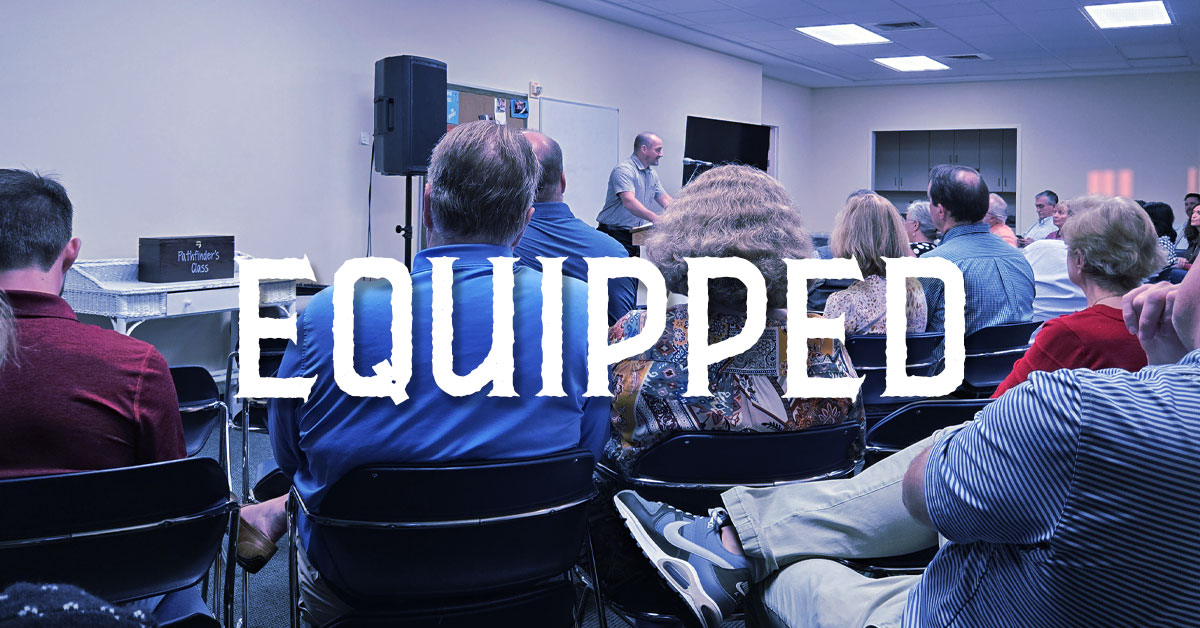Intro
Starting this month at First Baptist Montgomery, we’re diving into a transformative 9-week study called Equip. This isn’t just another class—it’s a journey through the rich landscape of philosophy, apologetics, and evangelism. Together, we’ll explore not only how to effectively defend the Christian faith but also how to understand the profound history of ideas that have shaped the world we live in today.
In Equip, we’ll trace the intellectual and spiritual threads that connect key historical moments to the challenges we face in the modern West. Why does our culture think the way it does? What philosophical and theological shifts have led us here? And most importantly, how do we respond faithfully as followers of Christ?
This study is designed to strengthen both your mind and your heart. You’ll gain tools for engaging in meaningful conversations about faith while growing in your understanding of the ideas and movements that have influenced the Western worldview.
Whether you’re new to apologetics or have been studying for years, Equip will encourage and challenge you. Come ready to think deeply, ask questions, and grow in confidence as we learn how to share the timeless truth of the Gospel in a culture desperate for hope.
Tactical Faith believes studies like Equip are vital for today’s church because they foster thoughtful discipleship and deepen our ability to engage with a world full of competing ideas. By equipping believers to understand both the roots of their faith and the cultural narratives around them, we can build bridges of truth and hope. This is why we do what we do—because thoughtful faith transforms lives.
Let’s grow together in faith, understanding, and boldness. I can’t wait to see you there!
-
A Church That Seeks Truth

First Baptist Montgomery’s Sunday Night Apologetics Series This 9-week journey is more than just an academic exercise—it’s about preparing our hearts and minds to love God with all our strength, soul, and mind (Mark 12:30) and to always be ready to give … Read more
Curriculum
Week 1: Introduction – Setting the Stage
Theme: Equip
Focus: Overview of worldview and apologetics.
Key Questions: What is a worldview? Why does it matter? What is apologetics, and how does it relate to faith?
Activities:
Define worldview and its components (metaphysics, epistemology, ethics).
Examine examples of competing worldviews (naturalism, postmodernism, Christianity).
Explore the relevance of apologetics through case studies.
Text: Francis Schaeffer, The God Who Is There (selections).
Weeks 2-5: Philosophical Foundations in the Western Tradition (Tasting the Richness of Chesterton’s World/Dante’s World)
Week 2: The Big Questions
Theme: Nurture
Focus: What is reality? (Metaphysics)
Key Texts:
Plato’s Allegory of the Cave (from The Republic).
Augustine, Confessions
Takeaway: Seeing all being as good, and as originating from God (the Good).
Discussion: How do these thinkers shape a Christian understanding of reality?
Week 3: Knowing Truth
Theme: Guide
Focus: How do we know what we know? (Epistemology)
Key Texts:
Faith and Reason:
What we see vs. how we see
Hebrews 11:1-3
Shoes and Footless Aliens: Knowledge defined and lost (reason, Gettier, and acquaintance)
Faith, Fideism, and Credulity: Descartes’ Meditations (on doubt and certainty).
Paradox as the Passion of Reason (Kierkegaard): The Eyes of Faith and the Tool of Reason
Takeaway: Reason and faith are only opposed when they step outside their proper domains—and an explanation of their nature and domains.
Discussion: Can faith and reason coexist?
Week 4: The Problem of Evil
Theme: Answer
Focus: Why is there suffering? How do different worldviews address evil?
Key Texts:
Augustine and the Manichees: Searching for a solution to evil
Job and his friends: Searching for a solution to suffering
Ivan Karamazov rejects the solution
The Ancient Mariner sees beauty and finds life
Takeaway: God is not the author of evil, and the solution to the irrationality (un-being) of suffering is not rational (and we refuse to accept the rational, until we are distanced from the suffering). It is God’s embrace.
Discussion: How does Christianity provide unique answers to suffering?
Notes:
Despotism is that state “in which decency affords no hope.” (a not exactly accurate quote of Tacitus, quoted by Rousseau—Discourse on Inequality, 89)
Week 5: The Good Life
Theme: Grow
Focus: What is the purpose of life?
Key Texts:
Poe, The Truman Show, and the Sadness of Beauty
A Taste of Eternity: Dialectical Activity and Propositional Desires (Brewer)
“Purity of heart is to will one thing”: Plato, desire, and the love of God
Beatrice, Diotima, and the Beatific Vision
Takeaway: Meaninglessness and its tie to dis-integration in human desire (including the Gnostic-like tendency to see some desires as essentially evil). Meaning in life tied to the integration of human desire which requires One who is the fulfillment of all human desire—or, rather, the One in Whose presence desire can be fulfilled in a truly unified manner (“flow” in the creation of beautiful things in the presence of the Beautiful).
Discussion: How does Christianity frame human flourishing?
Weeks 6-8: Traditional Apologetics
Week 6: Defending God’s Existence
Theme: Equip
Focus: Arguments for the existence of God.
Content:
The Cosmological Argument (Aquinas).
The Moral Argument (C.S. Lewis, Mere Christianity).
The Fine-Tuning Argument.
Activities: Engage in mock debates and practice articulating these arguments.
Week 7: The Reliability of Scripture
Theme: Answer
Focus: Can we trust the Bible?
Content:
Historical evidence for the Bible’s reliability.
The canonization of Scripture.
Archaeological and manuscript evidence.
Activity: Analyze key criticisms and prepare responses.
Week 8: Evangelism – Taking It to the World
Theme: Engage
Focus: Sharing the gospel effectively.
Content:
Understanding cultural contexts for evangelism.
The role of personal testimony.
Balancing truth and love in conversations.
Activity: Role-play evangelism scenarios with feedback.
Text: J.I. Packer, Evangelism and the Sovereignty of God (selections)
Week 9: The Resurrection
Theme: Guide
Focus: Defending the resurrection of Jesus.
Content:
Historical arguments for the resurrection (e.g., minimal facts approach).
Addressing alternative theories (hallucination, conspiracy, etc.).
Activity: Craft a defense for the resurrection in dialogue format.
